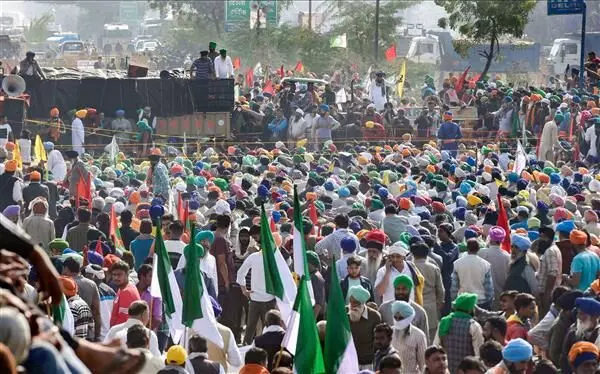
Gimmicks won't do to support farmers
text_fieldsThe Central government's decision to raise the support price of winter crop (kharif) including paddy is a step that can offer marginal relief to the farmers. The Minimum Support Price (MSP) that was Rs 1868 per quintal has been increased by Rs 72 to Rs 1940. Other crops also get marginal per quintal increase such as: maize gets Rs 20 per, ragi Rs 82; sunflower seed Rs 130, moong Rs 79, sesamum Rs 452, groundnut Rs 275, jowar and bajra Rs 118. In percentage terms, the raise given in the floor price across different crops ranges from 1.8 to 67 per cent. Central Agriculture Minister Narendra Singh Tomar said that the goal was to fix the MSPs at a level of at least 1.5 times of the All-India weighted average Cost of Production (CoP). He also said that top consideration has been given to crops whose prices would hurt the farmers most, i.e, oil seeds and pulses.
The Centre's decision with a marginal increase in the MSP's comes at a time when the farmer strike ongoing on the outskirts of Delhi has crossed half a year with greater intensity, and the protest leaders have initiated fresh political strategy. The core demand of the farmer organizations is that the farm laws passed by parliament in September last, which would hurt farmers, should be repealed. Although several rounds of negotiations were held at the instance of the Central government leadership, including the home minister, all discussions came to a stalemate with the roadblock of the Centre's incorrigible stand not to succumb to farmers' demands. The farmers have been raising about 40 demands including: make MSP part of farm laws, expand the existing public sector centres for procurement of crops from farmers, drop the plan to make private firms part of procurement, make trade mark registration compulsory to stop market exploitation and settle market disputes in civil courts. But the three laws, which the government got passed solely on the strength of its huge majority in parliament, are such that deny the farmers' rights and their long-standing demands. As a matter of fact, the farm law reforms introduced with fancy verbiage like farmer empowerment through price protection agreement, promotion of trade and marketing of agricultural products and reforms in essential goods law, are all designed to barter away agriculture and farm-related markets totally in favour of big corporates.
The reason why farmers do not budge on the demand for MSP and public procurement centres is the existential crisis that the agriculture sector faces and results in nearly 12,000 farmer suicides every year. In Bihar, where there is no regular system of public procurement centres, the farmers were getting prices Rs 600 – 700 less than what is declared by the government. And the government has set a time limit for procurement of food stuff in the Essential Commodities Act. When this comes under the control of private monopolies, those entities will be in a position to procure produce at their will and hold crops without releasing them to the open market thereby creating artificial price rise. Thus, through these steps, the laws passed by the government to serve corporate interest will amount to breaking the farmers' back. Before introducing such a piece of legislation, the Central government did not show even the elementary courtesy of consulting the farmer organisations or opposition parties. Instead, the Centre has been stubborn on its unwillingness to withdraw the farm laws, despite the farmer protests continuing for months. At the same time, what the latest decision to allow an increase in MSPs, though nominal, proves is the the government's latter day realisation that the farmers' demands are just and reasonable.
The minister cites the new decision as evidence of the government's sympathetic approach in the matter of MSP. But the farmer bodies complain that the level of MSP hike introduced by the government, which had claimed that the farmers' income would double, is nowhere near the fuel prices. All that can be said about the latest decision is that in its eagerness to end the farmer strike at any cost, the government is indulging in gimmicks aimed at neutralising the protest's tempo by dragging farmer bodies to dialogue at a time when states including UP are moving closer to assembly elections. But the Centre has no option to get out of the crisis other than by taking farmers into confidence recognising that the insecurity felt by the country's food providers will affect the very existence of the country, and by moving on to effective steps in right earnest and ending superficial treatment of the malady.











